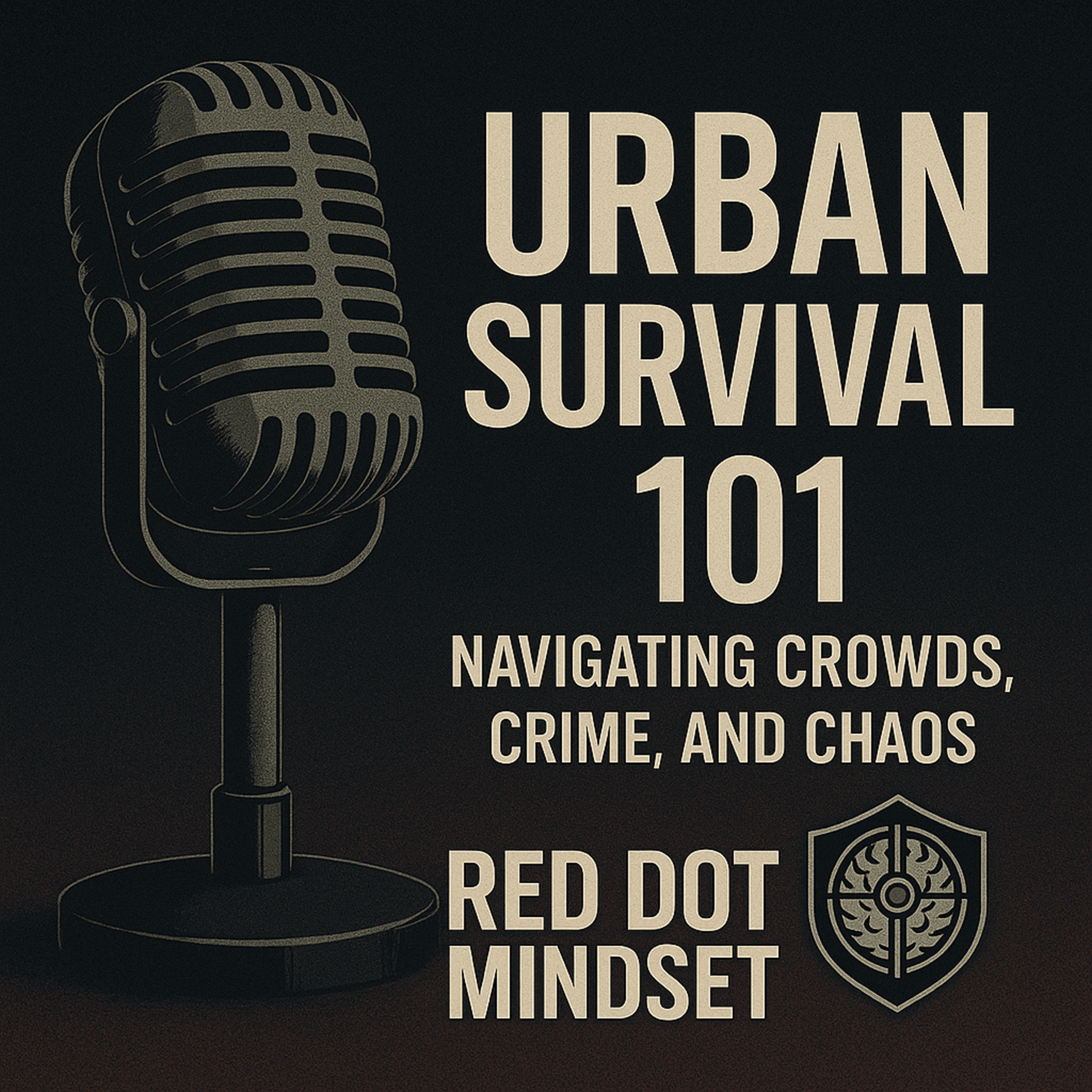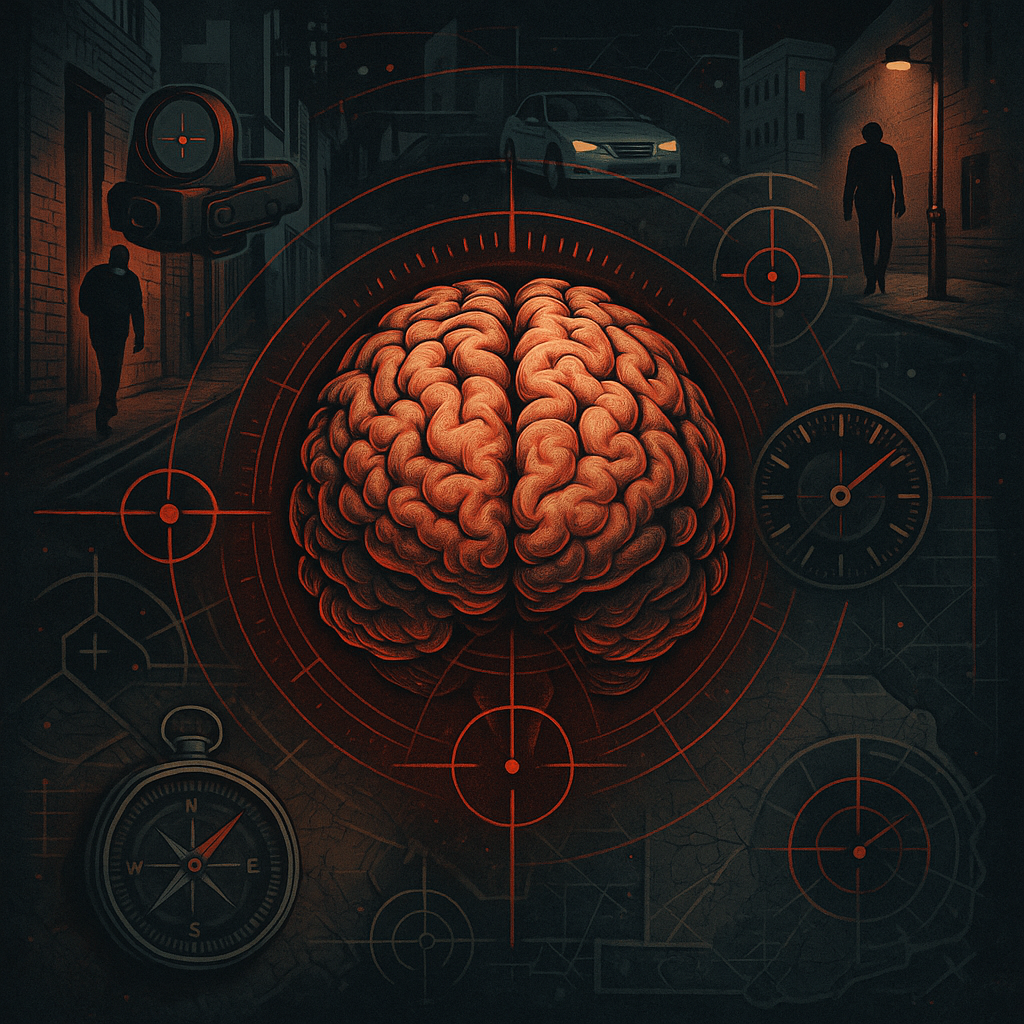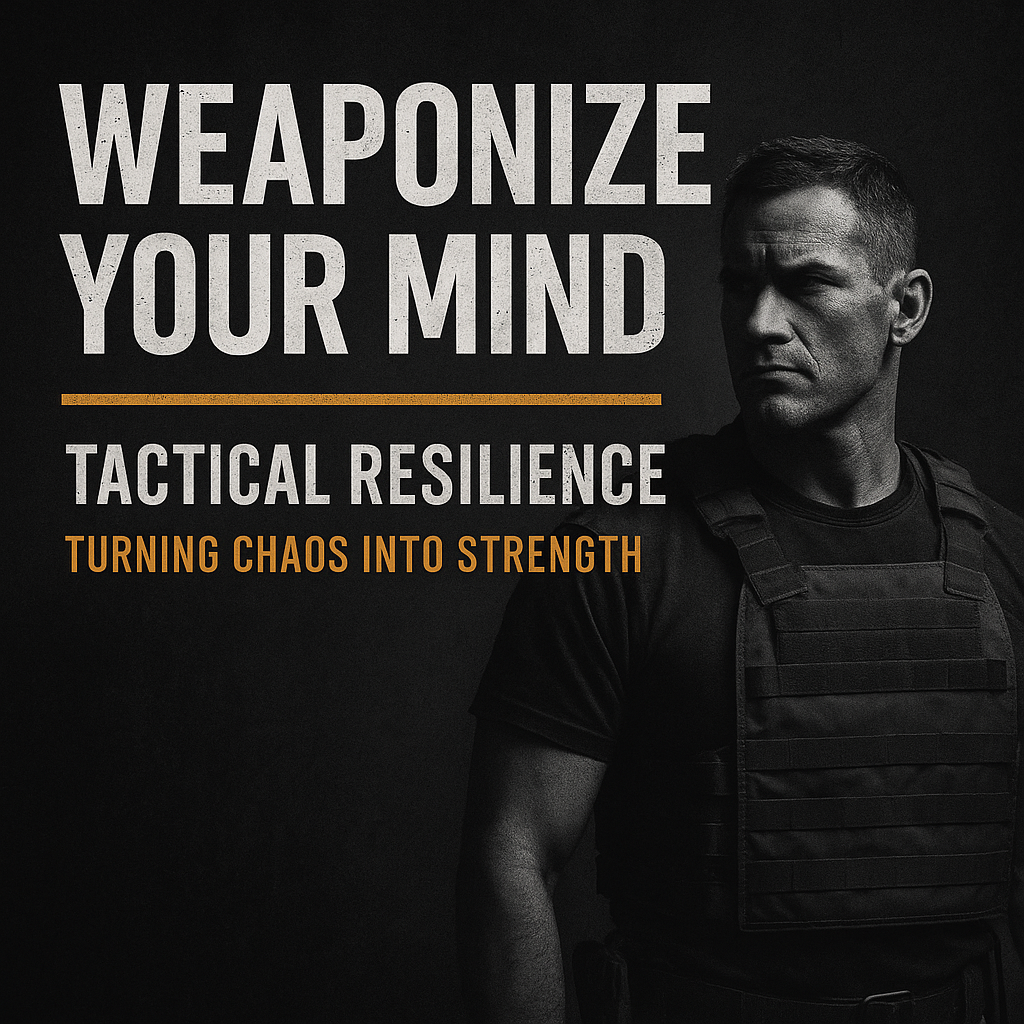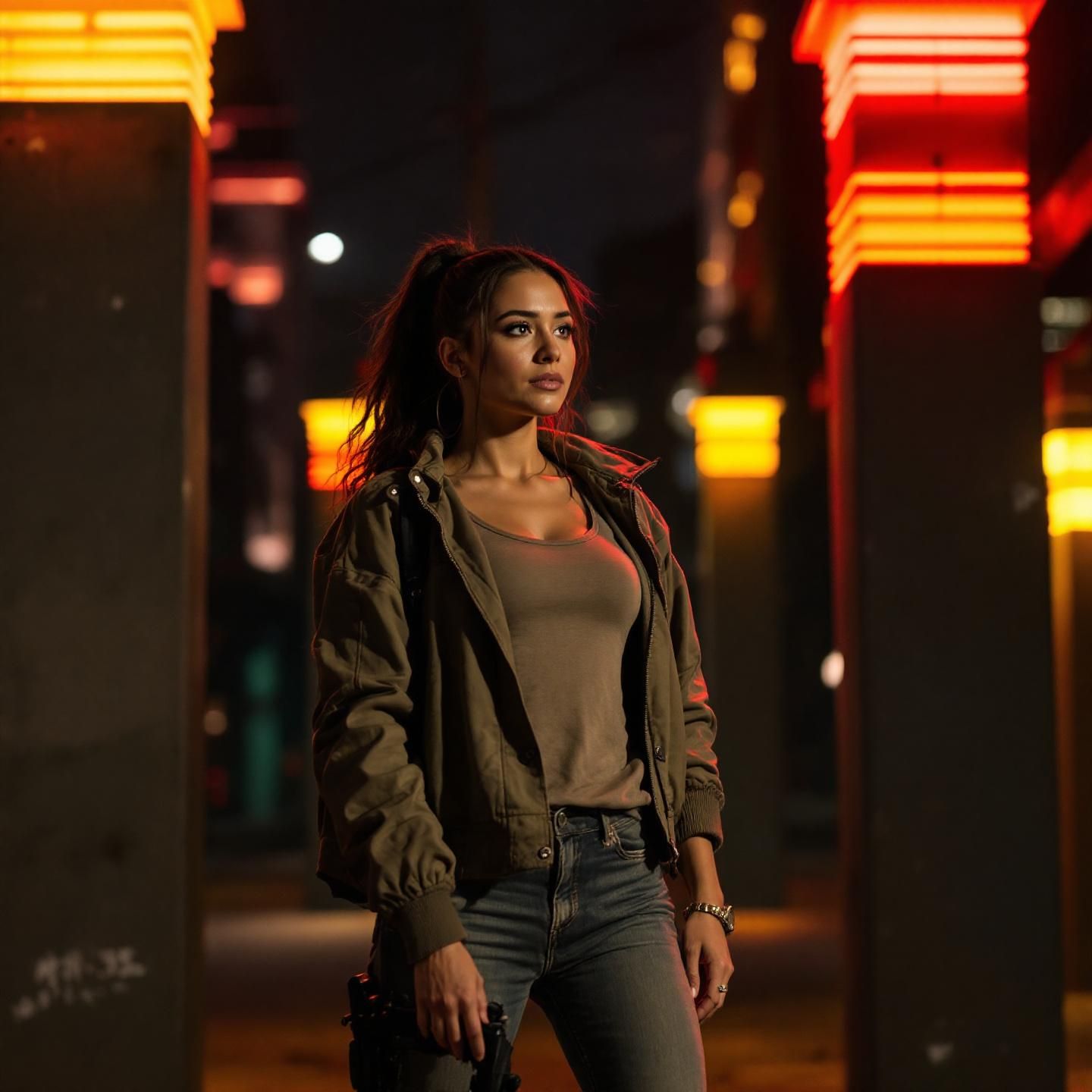Episode Transcript
[00:00:00] Speaker A: Welcome to the deep dive. Today we're really digging into something vital for anyone who spends time in cities. Urban Survival 101. Basically, navigating crowds, crime, and, well, potential chaos. Whether you live there, work there, or just visit, cities are, you know, dense. Lots of opportunity, but also hazards.
[00:00:20] Speaker B: That density is key. Yeah.
[00:00:22] Speaker A: So our goal here is to pull out some real practical tactics, focusing heavily on mindset to help you stay safer, more in control.
[00:00:29] Speaker B: Absolutely. Mindset first.
[00:00:32] Speaker A: We've looked at quite a bit for this. YouTube, channels like Survival Dispatch, Garen Thumb, Hang tough.
[00:00:36] Speaker B: Some good practical stuff there.
[00:00:38] Speaker A: Articles, blogs on urban prepping, emergency navigation, hidden dangers. Plus insights from books like Train the Mind, Win the Fight, and some compiled notes on preparedness.
[00:00:47] Speaker B: A real mix of sources. Yeah.
[00:00:49] Speaker A: So the mission today, extract those core urban survival skills. We're talking awareness, navigation, being resourceful, and like you said, mindset. Okay, let's get into it.
[00:00:59] Speaker B: Right. So cities, great places, centers of interaction, progress. Yeah, but we have to be real about the challenges, too. That high concentration of people, the constant noise and distractions, the anonymity. Well, it can unfortunately, create environments where crime might take root more easily than in, say, quieter areas.
[00:01:19] Speaker A: And it's not just a feeling, is it? There's data.
[00:01:22] Speaker B: Oh.
[00:01:22] Speaker A: Like the Bureau of Justice Statistics says, over half. Over 50% of violent crime in the US happens in urban counties.
[00:01:29] Speaker B: That's a huge concentration.
[00:01:31] Speaker A: And the FBI notes something like 80% of pickpocketing and thefts. They happen in crowded city spots.
[00:01:38] Speaker B: Yeah, crowds are a magnet for that kind of thing.
[00:01:40] Speaker A: So these numbers really just highlight the risks. It's not about being scared all the time, but being aware. Right. Realistically aware.
[00:01:47] Speaker B: Precisely. And that awareness, situational awareness, it's the foundation. And let's be clear, this isn't paranoia.
[00:01:53] Speaker A: Right.
[00:01:53] Speaker B: It's about cultivating an informed, proactive presence. Basically switching from just passively seeing things to actively processing what's around you.
[00:02:02] Speaker A: And that Cooper's color code framework is really useful here, isn't it? From Jeff Cooper's Principles of Personal Defense.
[00:02:08] Speaker B: Spot on. It gives you a scale, a way to think about your mental state. You've got white, totally unaware, tuned out.
[00:02:15] Speaker A: Like scrolling on your phone, oblivious.
[00:02:17] Speaker B: Exactly. Then yellow. That's relaxed alertness. Aware but not stressed.
[00:02:22] Speaker A: Okay.
[00:02:22] Speaker B: Then orange. Something specific has caught your eye. A potential threat you're assessing. And finally, red. Threat is imminent. Time to act.
[00:02:30] Speaker A: So it's about moving between these states. Appropriately.
[00:02:33] Speaker B: Yes. Knowing the colors isn't the main thing. It's building the habit of scanning, checking in with yourself. Consciously deciding, okay, what's the right level now? It's a proactive mental drill.
[00:02:45] Speaker A: And the challenge in cities, that distraction overload idea from train the mind, win the fight is just staying aware enough without getting totally frazzled. Right. You can't be an orange or red constantly.
[00:02:54] Speaker B: No way. That's exhausting. Yeah, but condition white, being unaware leaves you vulnerable. Yellow really is that baseline, that sweet spot for moving through the city day to day, relaxed but alert.
[00:03:05] Speaker A: Okay, makes sense. And tied into that awareness is trusting your gut. Right. Your instincts.
[00:03:10] Speaker B: Oh, absolutely crucial. Gavin de Becker's book the Gift of Fear really nails this. Your intuition picks up on tiny things, anomalies, stuff your conscious brain might just brush off.
[00:03:21] Speaker A: So if something feels off, listen to.
[00:03:24] Speaker B: It, don't dismiss it. Even if it's just crossing the street, changing your path. Do something. Your subconscious is working overtime.
[00:03:32] Speaker A: So what does that act of observation look like? Practically speaking? What are we watching for?
[00:03:37] Speaker B: It's consciously looking at people, how they're acting, interacting, noticing vehicles, anything seem odd or out of place, Paying attention to activities, sounds. Does it fit the normal pattern?
[00:03:48] Speaker A: Right.
[00:03:49] Speaker B: And crucially, always, always be mentally clocking potential exits. Where could you go? What looks like a temporary safe spot if needed.
[00:03:56] Speaker A: And minimizing distractions. Phone down. Music low.
[00:03:59] Speaker B: Definitely be mindful of the phone when walking. Maybe keep it away unless you actually need it for directions. Music. Yeah, keep it low enough you can still hear what's happening around you. Just be present.
[00:04:09] Speaker A: Okay, so awareness is dialed in. How about moving safely, Especially through crowds. Those can be tricky.
[00:04:15] Speaker B: They really are. Crowds are sort of a double edged sword. They offer cover, anonymity.
[00:04:19] Speaker A: Yeah, you can disappear, but they can.
[00:04:21] Speaker B: Also turn chaotic incredibly fast. And you're definitely more vulnerable to things like bigpockets or worse, stampedes in panic situations.
[00:04:30] Speaker A: So what are some good tactics for navigating, say a busy street fair or a packed train station?
[00:04:36] Speaker B: Generally try staying near the edges of the main flow. It gives you a bit more breathing room, better visibility, and it's easier to move if you need to.
[00:04:44] Speaker A: Okay.
[00:04:44] Speaker B: Keep mobile. Don't get stuck deep in the middle where you can't maneuver. And watch the crowd itself. See how it's moving. Any sudden shifts, surges that could signal trouble?
[00:04:54] Speaker A: A warning sign.
[00:04:55] Speaker B: Exactly. And if things do go bad, if panic starts, remember the advice to move diagonally across the flow. Don't fight directly against it. Seems weird, but helps avoid getting knocked down.
[00:05:06] Speaker A: That actually makes a lot of sense. What if you're with family, kids and a crowd?
[00:05:09] Speaker B: Ah, yeah, that Needs extra planning before you even go in. Pick rally points. Specific easy spots to meet if you get separated.
[00:05:17] Speaker A: Good idea.
[00:05:18] Speaker B: Use visual cues. Bright clothing helps. Maybe simple hand signals for noise. And make sure kids know your phone number. Maybe have it written down somewhere on them just in case. Plan ahead.
[00:05:28] Speaker A: Definitely. Okay. Shifting slightly. What about just getting around the city generally, Especially if, you know, GPS fails? We rely on phones so much that.
[00:05:39] Speaker B: Reliance is a real thing. Yeah, there are studies suggesting people who use GPS all the time actually have a weaker natural sense of direction.
[00:05:46] Speaker A: Really? Huh.
[00:05:47] Speaker B: Yeah. So digital tools are great, super convenient. But we need those backup skills. Don't let the old ways fade completely.
[00:05:54] Speaker A: So, back to basics. Maps. Compass.
[00:05:57] Speaker B: Absolutely. Paper maps. Knowing how to use a compass, these are vital backups. Power grid down, cell service out. These are what you'll need. Maybe make it a monthly goal. Practice those skills.
[00:06:07] Speaker A: Dust off the Alice. Okay. Besides maps, what else helps with orientation?
[00:06:10] Speaker B: Landmarks are huge. Pay attention. Distinct buildings, parks, statues, whatever stands out, they become mental anchors. And understanding the city's grid system, if it has one. Knowing how the streets are laid out gives you a massive advantage for mental mapping. Apparently, only about 30% of people really know their city's grid. Worth looking into.
[00:06:32] Speaker A: What about using the sun? Does that work?
[00:06:34] Speaker B: In a city, you can get a general direction. Yeah, east for sunrise, west for sunset, roughly. But as Survival dispatch pointed out, closer to the equator, it's less reliable. Especially midday sun overhead, not much health, Pretty much. And clouds obviously interfere. So it's a basic indicator, but not super precise for urban navigation.
[00:06:53] Speaker A: Survival Dispatch also mentioned getting high up, finding a tall building for a better view.
[00:06:58] Speaker B: Yeah, that's a solid tactic. Get an elevated perspective. Even just a few floors up. In an accessible building, you can spot landmarks easier, see potential roadblocks, get the lay of land. Really helps with planning your route.
[00:07:09] Speaker A: And what about urban exploration mentioned in one article? Is that recommended?
[00:07:12] Speaker B: Well, exploring less traveled parts of the city can help you find alternate routes, maybe spot resources. But, and this is critical, you must respect laws and property rights.
[00:07:22] Speaker A: No trespassing.
[00:07:23] Speaker B: Absolutely not. Think of it more like being extra observant during your normal routines. Noticing alleys, paths, interesting features. Building that mental map legally and safely.
[00:07:33] Speaker A: Okay, got it. Now, what if things get really serious, like an earthquake? Flood. Major unrest, maybe a Campbell spill. How do navigation priorities change then?
[00:07:44] Speaker B: Those situations demand specific skills. Earthquake. You need to spot sturdy structures quickly. Flood, high ground, is everything, right. Chemical spill. Knowing wind direction is vital. Move perpendicular to it across the wind to get out of the plume's path. Fastest.
[00:07:59] Speaker A: Okay.
[00:08:00] Speaker B: Perpendicular power outage, Night navigation skills become key. Civil unrest, moving through crowds safely is critical. Priorities shift based on the specific threat.
[00:08:10] Speaker A: Okay, so we've covered awareness and navigation. Let's talk resources. Water, food, shelter. In a crisis, where do we find them? In a city, if the usual systems.
[00:08:18] Speaker B: Are down, water becomes huge challenge quickly. If the taps run dry or get contaminated. Survival dispatch had some interesting ideas about sources.
[00:08:25] Speaker A: They mentioned pool water, but cautioned about the chlorine levels being potentially harmful. Right?
[00:08:31] Speaker B: Exactly. Chlorine might kill bugs, but drinking high concentrations isn't good. They also mentioned irrigation lines, but that water is often not treated for drinking.
[00:08:40] Speaker A: So potentially unsafe.
[00:08:42] Speaker B: Potentially, yes. And tapping PVC water lines was another idea, but again, contamination risk. And you need storage and purification.
[00:08:50] Speaker A: So no matter where you might find it, purification is non negotiable.
[00:08:54] Speaker B: Absolutely. Boiling is gold standard if you have heat. Portable filters, UV purifiers, chemical tablets, iodine or chlorine are essential kit.
[00:09:02] Speaker A: And avoid that pool or irrigation water unless treated properly.
[00:09:06] Speaker B: Definitely. And like survival dispatch said, just having containers, even old plastic bottles is step one for water storage.
[00:09:12] Speaker A: Makes sense. What about shelter?
[00:09:14] Speaker B: If home isn't safe, home is always plan A. But if you have to leave, alternatives could be empty buildings, closed stores. Though getting in might be tough. Official reshelters, or even as a last resort, abandoned vehicles. You have to judge the safety of any spot.
[00:09:29] Speaker A: Now. The Urban survival guide really stressed blending in. Why is that so important?
[00:09:34] Speaker B: It's about not drawing attention. Your appearance, clothes, attitude, keep it low key, hide valuables, keep weapons concealed. Don't advertise your preps.
[00:09:44] Speaker A: Don't make yourself a target.
[00:09:45] Speaker B: Exactly. Avoid big crowds, stay out of trouble or unrest. The less you stand out, the safer you generally are. From desperate or opportunistic people.
[00:09:53] Speaker A: Makes perfect sense. And supplies? What should be in that ready bag or home stash?
[00:09:58] Speaker B: For urban survival, a solid kit is crucial. Non perishable food, water or purification means good first aid kit, flashlight batteries, multi tool, essential stuff.
[00:10:09] Speaker A: The Urban Prepping Secrets article talked about smart stockpile. Staples.
[00:10:13] Speaker B: Yeah. Canned goods, dry goods, essential meds, shelf stable basics. And having that ready bag, sometimes called a get home bag, packed and accessible is key for quick evacuations or getting home. If stranded enough for, say, 24 to 72 hours.
[00:10:27] Speaker A: The survive in a broken world notes had a detailed list for that bag. Cash, map, compass, hand crank, radio, even lock picks. Seems pretty thorough.
[00:10:35] Speaker B: A good list. Leaning toward more advanced prep. Your specific bag depends on your situation, your city, your likely routes. But the principle is the same. Essentials to survive short term and get somewhere safe.
[00:10:46] Speaker A: Okay, in a longer term breakdown, Garen Thumb talked about scavenging. Where might you look? Besides looted grocery stores?
[00:10:54] Speaker B: Yeah, they rightly pointed out stores get emptied fast. So think upstream. Distribution centers, warehouses, manufacturing sites, maybe schools. Construction sites could have useful stuff too. Tools, materials, maybe water. Think outside the retail box.
[00:11:10] Speaker A: And food scavenging. They had some pretty grim advice about bad meats.
[00:11:15] Speaker B: Yeah, suggesting you might cut away rancid parts of a steak and cook the center thoroughly. Look, that's extreme survival. Food poisoning is incredibly dangerous, especially with no doctors. Huge risk.
[00:11:26] Speaker A: Probably best avoided if possible.
[00:11:27] Speaker B: Absolutely. Same with urban plants. Unless you are an expert at identifying edible ones, don't risk it. Poisoning is a real danger.
[00:11:34] Speaker A: The Hang Tufts video had that possum mentality idea. Keep an eye out for useful discarded stuff.
[00:11:39] Speaker B: Yeah, basically be opportunistic. See value where others don't. Discarded tools, containers they showed finding a usable water bottle. Just being observant.
[00:11:49] Speaker A: And bartering. What becomes valuable when money maybe isn't.
[00:11:53] Speaker B: Things we take for granted now. Cigarettes, alcohol, coffee. Basic hygiene like soap, toothpaste. Those become real currency. And skills too. Basic repairs, filtration. Know how. Generator, fixing. Practical skills or wealth.
[00:12:07] Speaker A: Okay, so awareness, navigation, resources. What if prevention fails? Self defense comes into play, Then it does.
[00:12:14] Speaker B: As Survival Dispatch said, if awareness doesn't stop an encounter, first aid and self defense skills are your next layer. Basic techniques can make a huge difference.
[00:12:23] Speaker A: And non lethal options. Pepper spray alarms?
[00:12:25] Speaker B: Yes, the Hidden Dangers article mentioned those. They can deter an attacker, give you a chance to escape and are generally legal to carry in most cities. Worth checking local laws though.
[00:12:34] Speaker A: Right? And communication in a crisis. How do we stay connected if phones are grown?
[00:12:38] Speaker B: Need a plan prearranged. Check ins with family, designated meeting spots, physical locations. Alternative comms help too. Walkie talkies, battery powered radios for news, maybe group messaging apps. If wi fi pops up the survive.
[00:12:51] Speaker A: In a broken world Note suggested rendezvous points outside the city too for evacuation.
[00:12:56] Speaker B: Smart. Very smart. And building a trusted local network. Neighbors, friends you know are reliable for info sharing, mutual aid. But be discerning who you trust. Stick with prepared, capable people. Using diversion safes for supplies was also mentioned. Good idea.
[00:13:13] Speaker A: Now sometimes getting out of the city is the goal. Garen Thumb's urban Evasion video covered this. Key principles.
[00:13:21] Speaker B: Planning escape routes before you need them is number one. Have multiple options. Think about traffic, roadblocks, alternative transport.
[00:13:27] Speaker A: And if you think you're being followed, how do you break contact?
[00:13:31] Speaker B: Quick, unpredictable direction changes. Use crowds for cover. Change your appearance fast. Hat on off, jacket on off Even ditching a shirt quickly like they showed. Confuse the follower, break their line of.
[00:13:42] Speaker A: Sight and after breaking contact, they mentioned a height site. What's that?
[00:13:46] Speaker B: It's a temporary hidden high point somewhere you can stop. Observe unseen, check resources, plan your next move. Crucially, they stressed needing overhead cover, protection from drones or aerial view.
[00:13:58] Speaker A: Makes sense. How do you move to avoid attention during evasion?
[00:14:02] Speaker B: Act natural, blend in, match the crowd's pace and posture. Don't make lots of eye contact. Sometimes moving with the crowd briefly, even if it's the wrong way, helps you blend before peeling off. Simple disguises like a hy vee vest might help sometimes.
[00:14:16] Speaker A: And move at night if possible.
[00:14:18] Speaker B: Yeah, darkness is your friend for evasion. Reduced visibility helps a lot Communication alternatives.
[00:14:23] Speaker A: If cell networks are jammed or down.
[00:14:25] Speaker B: During an evac, they mentioned older burner phones where you can pull the battery makes them untrackable when off Analog or DMR radios for short range and mesh networks like meshtastic lets you text peer to peer without cell towers if enough people nearby have nodes.
[00:14:39] Speaker A: Okay, finally, let's talk mindset. This came up again and again as the most crucial element.
[00:14:43] Speaker B: It really is like Train the mind, win the fight says mental readiness trumps gear most times that positive resourceful winners find a way Attitude, survival, dispatch talked about that's key.
[00:14:55] Speaker A: Managing emotions, staying calm under pressure, absolutely.
[00:14:59] Speaker B: Controlling fear, staying focused when things are chaotic. That's trainable.
[00:15:04] Speaker A: And having a support system important for mental well being too, right?
[00:15:07] Speaker B: Hugely trusted people to talk to, rely on, work with makes a massive difference in handling stress. Practicing stress management helps too. Journaling, meditation, breathing exercises build that resilience. And lifesurvivalistskill.com said adaptability, emotional control, Keep learning.
[00:15:25] Speaker A: So for listeners wanting to go deeper, what are some top resources we came across?
[00:15:29] Speaker B: Well, we mentioned several the Gift of Fear by D.E. becker for Intuition, Jason Hansen's spy books for practical tactics Left of Bang for spotting threats early 100 deadly skills by Emerson Cooper's principles of personal defense for mindset, Grossman's on combat and on Killing for the psychology and that urban prepping.
[00:15:47] Speaker A: Book mentioned in one article, right?
[00:15:49] Speaker B: Plus online forums, local cert groups for practical skills and community lots out there.
[00:15:53] Speaker A: This has been incredibly useful. It really drives home that while cities have unique risks, being proactive, aware and prepared gives you back a lot of control. That core message train the mind to win the fight really lands. If you found this deep dive helpful, maybe share it could give someone else an edge. Feel free to reach out with questions. We've put links to resources like graymatterrops.com and those survival sites in the description.
[00:16:18] Speaker B: And just a final thought to leave you with. In the city, yeah, gear matters. But your biggest asset is upstairs, what you know and how you think. So think about your daily routes, your commute, your neighborhood walks. After this discussion, what potential challenges and maybe more importantly, what opportunities for preparedness do you see now that you didn't before?




